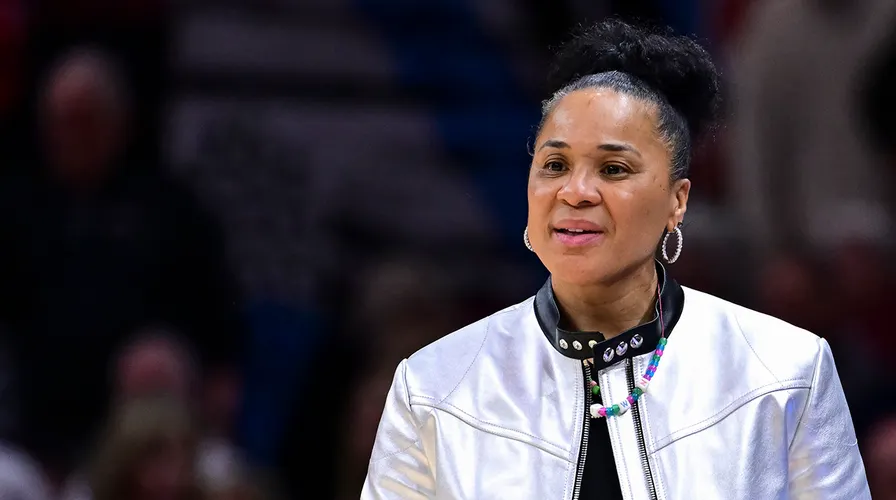Dawn Staley is synonymous with success, integrity, and transformation. One of the most iconic figures in women’s basketball, she has built a dynasty at South Carolina, delivering championships, cultivating culture, and inspiring generations. But in a recent candid conversation, the Hall of Famer shared a lesser-known turning point in her journey—one that could have dramatically altered the landscape of college basketball: she turned down Alabama before saying yes to South Carolina.
For fans and followers, it’s hard to imagine Staley anywhere else but Columbia. The Gamecocks are her team. The garnet and black are her colors. The program’s relentless excellence and unshakeable identity reflect her values. But long before the championship banners flew from Colonial Life Arena and before her name was etched alongside legends, a different path nearly unfolded in Tuscaloosa.
Alabama came calling in the mid-2000s when Staley was still head coach at Temple University, a small but fierce program that she had elevated with grit and grace. Back then, Alabama women’s basketball was seeking a resurgence. The program had talent, resources, and ambition—but it lacked a visionary, a unifying force who could rekindle its glory days. University officials saw that force in Staley.
“They were serious,” Staley recalled. “They flew out, made their pitch, offered everything a coach could want—money, facilities, the chance to compete in the SEC. It was tempting. Really tempting.”
At the time, Staley was just beginning to make her mark as a coach. She had already built a storied career as a player—three-time Olympic gold medalist, six-time WNBA All-Star, and one of the most respected floor generals the game had ever seen. Her transition to coaching at Temple had been strategic and personal. The Philadelphia native wanted to stay close to her roots, give back to the community that raised her, and prove she could lead a program without shortcuts.
“I wasn’t looking for a shortcut to success,” she explained. “I needed to do it my way, earn it my way. At Temple, we didn’t have the bells and whistles, but we had heart. That mattered to me.”
When Alabama’s offer came in, it wasn’t just about resources. It was a moment of reckoning. Staley had to decide if she was ready to leave behind the program she built, her hometown connections, and the intentional, methodical path she had chosen. The SEC’s allure was strong—more visibility, higher stakes, and an opportunity to battle the nation’s best night in and night out. But something inside her said the timing wasn’t right.
“I didn’t want to move for the sake of moving,” she said. “There’s a difference between ambition and purpose. I’ve always tried to follow purpose.”
Purpose, as it turns out, had a different plan. Just a few short years later, South Carolina came calling—and this time, everything clicked.
“It was different with South Carolina,” Staley said. “It wasn’t just the SEC or the salary. It was the feeling. The people. The vision they had and the freedom they offered to build something meaningful. They didn’t want a quick fix. They wanted a foundation. And they trusted me to lay it.”
Taking the job in Columbia wasn’t a no-brainer, though. When Staley arrived in 2008, the Gamecocks were far from a national powerhouse. The team had experienced flashes of relevance but lacked consistency and national respect. Yet South Carolina’s administration had a bold belief in what the program could become under the right leadership—and they saw that in her.
She inherited a program with no rich tradition in women’s basketball, no clear identity, and a conference full of heavyweights. It was a daunting assignment. But that was part of the appeal. She didn’t want to walk into a program that had already been built—she wanted to build it.
Brick by brick, recruit by recruit, year by year, Staley transformed the Gamecocks. She established a culture of accountability, resilience, and joy. She refused to cut corners, even when progress was slow. She recruited not just talent but character. Her teams reflected her own journey—underdogs with fight, discipline, and heart.
The breakthrough came in 2015 when the Gamecocks reached the Final Four. Two years later, they won their first national championship. In 2022, they won again, this time going wire-to-wire as the No. 1 team in the country. And in 2024, she did it again—cementing herself as a generational coaching icon.
Looking back, the decision to turn down Alabama makes perfect sense. But at the time, it took clarity and courage.
“Alabama is a great school, great athletics, great people,” she said. “But I’m glad I waited. I’m glad I listened to that little voice that said, ‘Not yet. Not here.’ Because if I had gone there, I don’t think South Carolina happens. And South Carolina—what we’ve built here—it’s been the honor of my life.”
Indeed, Staley has turned South Carolina into more than just a winning program. It’s a movement. Her players speak glowingly not just about the wins but about the growth. About how she empowers them to lead, to speak out, to stand tall in a world that doesn’t always value Black women as it should. About how she teaches them the game—and also how to live with dignity and drive.
“Coach Staley is different,” one former player said. “She sees you. All of you. And she pushes you to be more—not just on the court, but in life. She wants greatness for you, not just from you.”
That dual mission—excellence and empowerment—is what sets Staley apart. Her voice carries far beyond the hardwood. Whether she’s advocating for equity in women’s sports, standing up for her players’ rights, or supporting social justice causes, she walks the talk. And that commitment stems, in part, from the road she’s traveled—the choices she made, including the ones that weren’t easy.
“There’s a time and place for everything,” Staley said. “You don’t always know why you say no to something until years later, when you look back and realize the ‘no’ was really a ‘yes’ to something greater.”
The “yes” to South Carolina has changed lives—not just her own. Her impact is generational, rippling out to young girls watching from afar, to coaches modeling her leadership style, to fans who now see women’s basketball not as an afterthought but as appointment viewing.
Could she have done the same at Alabama? Possibly. But it wouldn’t have been this. It wouldn’t have been this exact journey, this exact community, this exact blend of challenge and triumph. There’s something sacred about the fit between a coach and a program—and in Staley’s case, the fit with South Carolina has been extraordinary.
Now entering the next chapter of her career, with multiple national titles and countless accolades to her name, Staley is focused not on legacy, but on love. Love for the game, for her players, for the process. She hasn’t forgotten where she came from—and she hasn’t lost sight of where she’s going.
“I’m still learning. Still growing. Still figuring it out,” she said with a smile. “But I’m proud of the path I’ve taken. Every step—even the steps I didn’t take—led me here. And here is exactly where I’m supposed to be.”
In the ever-evolving story of women’s basketball, Dawn Staley’s chapter is one of purpose, power, and patience. She turned down a promising opportunity not because it wasn’t good—but because she believed something greater was on the horizon. And when that greater thing arrived, she embraced it with open arms, open heart, and a determination that continues to redefine what’s possible.
South Carolina didn’t just get a coach. It got a builder. A beacon. A believer. And the game of basketball is better for it.



